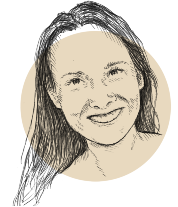They reunited on the day that they buried their mother, Evelyne Pisier, like “a slightly decrepit rock group.” Camille, her twin Victor, their older brother Colin, and the two youngest siblings Luz and Pablo. A big, blended family, the children of the familia grande, a term invented by their stepfather to describe this extended family, who would meet every summer in their house in Sanary-sur-Mer, near Toulon, which had been transformed into a utopian community.
In 2017, Camille Kouchner’s world collapsed. She had lost her much-loved mother, a brilliant public law professor who had been floundering in a sea of sadness and alcohol since her own mother had committed suicide in the mid-1980s. In the early 1960s, she had traveled to Cuba with her younger sister, the actress Marie-France Pisier, and met two men: Bernard Kouchner, her future husband and the father of her three oldest children, and Fidel Castro, who became her lover for a time. This revolutionary youth had instilled within her a lasting love of freedom and a marked distaste for propriety, which she passed down to her children. Camille Kouchner grew up with this mother, wrapped in a veil of cigarette smoke, in a whirlwind of intelligence.
When Evelyne Pisier left Bernard Kouchner, a humanitarian doctor destined for a ministerial career, she moved away with her three children and met her future husband, constitutional law professor Olivier Duhamel. For many years, Camille Kouchner saw this flamboyant stepfather, a man ten years younger than her mother, as a rock, a surrogate father who took her everywhere, read her books, and later taught her law. In the summer, at his house in Sanary-sur-Mer, he was a king surrounded by an increasingly large court, and he encouraged everyone to forget the rules and ignore prudishness.
This sunny side was boldly brandished for years before the fake happiness cracked. When they were around 14 years old – their memories are clouded – Victor confessed to his twin sister that their stepfather had repeatedly subjected him to sexual violence. Petrified, Camille said nothing. Silence took root and guilt “uncoiled,” “like a snake.” “For all those years, and long afterward, I protected my stepfather,” writes Camille Kouchner. “Not because my brother was asking me to but because I loved him like a father and – in our atomized family and confronted with my mother’s downward spiral – he was all that was left to me.” Those familiar with the family, the old revolutionary left-wing bound by the prestige and power of the French republic, closed their eyes. Warned about what had happened in 2008, just as Camille Kouchner had given birth to her second child, Evelyne Pisier took her husband’s side and sank even deeper. Marie-France Pisier was the only one who wanted to speak out, but she died before she could.
The silence almost killed Camille Kouchner. It took her 30 years to face this hydra, first by using the weapons of the law, then by blazing a trail with words, without a single superfluous sentence. The Familia Grande is a shocking account of the mechanisms of control and stifled speech, but above all a poignant and posthumous declaration of love to a mother with “glorious blue eyes.”

The Familia Grande: A Memoir by Camille Kouchner, translated from French by Adriana Hunter, Other Press, May 17, 2022. 224 pages, 24 dollars.
Article published in the May 2022 issue of France-Amérique. Subscribe to the magazine.












